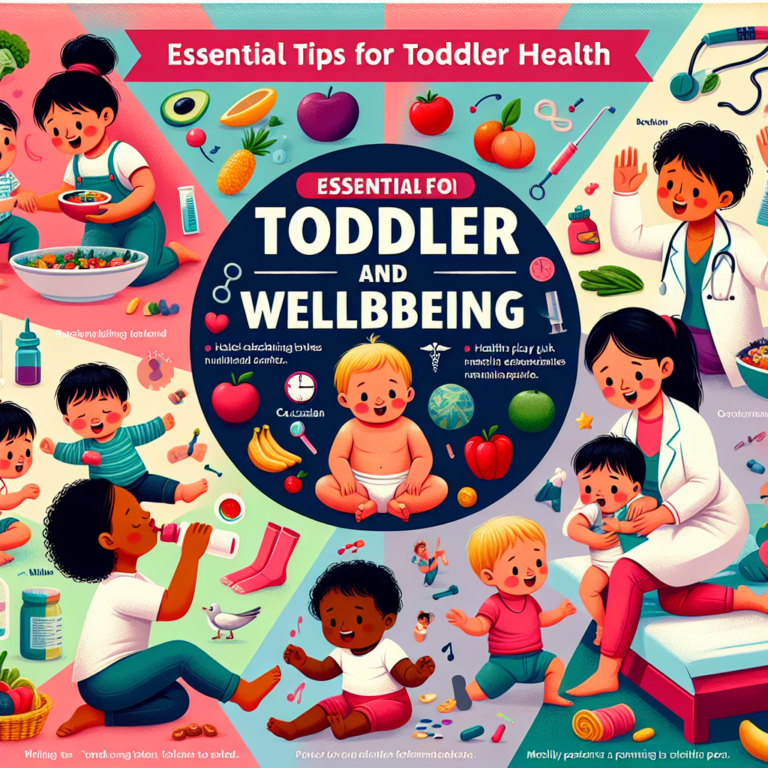In the vibrant and ever-evolving journey of raising a toddler, ensuring their health and wellbeing takes center stage. As parents and caregivers navigate the exciting yet challenging toddler years, understanding the key elements that contribute to optimal growth and development becomes essential. This article delves into the world of toddler health and wellbeing, offering valuable insights and practical advice to support your child’s flourishing journey. With sections dedicated to “Essential Tips for Promoting Toddler Health and Wellbeing” and “Understanding Toddler Nutrition: Key Factors for Optimal Growth,” we aim to equip you with the knowledge needed to nurture a thriving toddler. From balancing nutrition to fostering emotional and physical health, explore how you can lay a strong foundation for your toddler’s future.
1. “Essential Tips for Promoting Toddler Health and Wellbeing”
Promoting toddler health and wellbeing is crucial for ensuring a strong foundation for their future development. During these formative years, toddlers experience rapid growth and development, making it important for parents and caregivers to provide a supportive environment that fosters both physical and emotional health. Here are some essential tips to consider:
1. **Balanced Nutrition**: A well-balanced diet is vital for toddlers as it supports their growth and energy needs. Ensure your toddler’s diet includes a variety of fruits, vegetables, whole grains, proteins, and healthy fats. Encouraging healthy eating habits early on can set the stage for lifelong nutritional wellness.
2. **Regular Physical Activity**: Toddlers are naturally active and need plenty of opportunities to move. Encourage activities that promote physical fitness, such as playing in the park, dancing, or simple games that involve running and jumping. Physical activity not only strengthens their bodies but also contributes to their cognitive and emotional health.
3. **Adequate Sleep**: Sleep is essential for a toddler’s development. Establish a consistent bedtime routine to help your toddler get the recommended amount of sleep, which typically ranges from 11 to 14 hours, including naps. Quality sleep supports brain development, emotional regulation, and overall wellbeing.
4. **Routine Health Check-ups**: Regular visits to the pediatrician are crucial for monitoring your toddler’s health. These check-ups allow for early detection of potential issues and ensure that vaccinations are up-to-date, safeguarding your toddler against common childhood illnesses.
5. **Emotional Support and Bonding**: Building a strong emotional connection is key to your toddler’s wellbeing. Spend quality time with your toddler, engage in interactive play, and encourage open communication. Understanding and responding to their emotional needs helps foster a secure and trusting relationship.
6. **Safe Environment**: Toddlers are naturally curious and explore the world around them. Ensure your home is a safe environment by childproofing areas and keeping harmful substances out of reach. Safety measures prevent accidents and provide a secure space for your toddler to play and learn.
 Also Read:
Optimizing Toddler Health and Wellbeing: Essential Nutrit...
Also Read:
Optimizing Toddler Health and Wellbeing: Essential Nutrit...
7. **Social Interaction**: Encourage your toddler to interact with peers through playdates or group activities. Social interaction is essential for developing communication skills and learning how to navigate relationships with others.
By integrating these tips into daily routines, parents and caregivers can contribute significantly to their toddler’s health and wellbeing. Creating a nurturing and supportive environment helps to ensure that toddlers thrive during this critical stage of their development.
2. “Understanding Toddler Nutrition: Key Factors for Optimal Growth”
Proper nutrition is crucial during the toddler years, as it lays the foundation for a lifetime of health and wellbeing. Understanding toddler nutrition involves recognizing the unique dietary needs that support their rapid growth and development. During this stage, toddlers require a balanced diet that includes a variety of nutrients to ensure optimal growth and overall health.
One of the key factors in toddler nutrition is ensuring the right balance of macronutrients—carbohydrates, proteins, and fats. Carbohydrates are the primary source of energy for active toddlers and should come from whole grains, fruits, and vegetables. Proteins are essential for muscle development and can be obtained from sources such as lean meats, beans, and dairy products. Healthy fats, found in foods like avocados, nuts, and fish, are vital for brain development.
Micronutrients, including vitamins and minerals, play an equally important role in toddler nutrition. Iron is crucial for cognitive development and is commonly found in foods like fortified cereals, lean meats, and leafy vegetables. Calcium and vitamin D are important for bone health, and can be sourced from dairy products and fortified plant-based alternatives. Additionally, vitamin C aids in iron absorption and supports the immune system, and can be found in fruits like oranges and strawberries.
Establishing healthy eating habits is another critical aspect of toddler nutrition. Encouraging a variety of foods and flavors can help prevent picky eating and ensure that toddlers receive a well-rounded diet. It’s important to offer regular meals and snacks, allowing toddlers to listen to their hunger cues and develop a positive relationship with food.
By understanding the key factors of toddler nutrition, parents and caregivers can provide the essential nutrients that support optimal growth and development, setting the stage for a healthy future.
